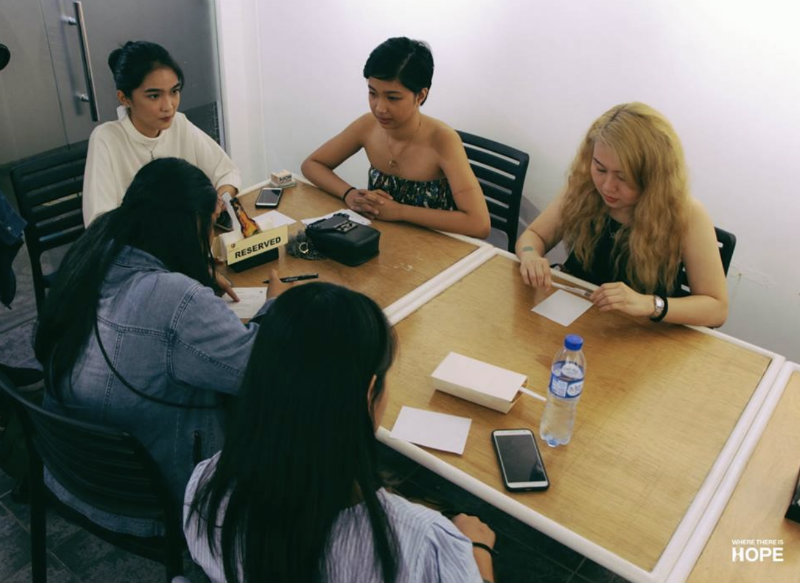
MANILA, Philippines – How can art and Scripture help patients with psychiatric disorders?
In the Philippines, one in 5 Filipino adults has some form of mental illness, according to the Department of Health (DOH).
Given this, a group of young Filipino millennials formed Christian and non-profit organization Where There Is Hope (WTIH).
The group's name is inspired by Psalm 42:11 from the Bible. It reads: "Why, my soul, are you downcast? Why so disturbed within me? Put your hope in God, for I will yet praise him, my Savior and my God."
WTIH's aim is to "provide a safe outlet for those dealing with mental health issues through Scripture, testimony, and art."
Turning to God, art
It was only in 2017 when, like an answered prayer, founder and executive director Juliann Savard met the individuals who would be working with her in the future for WTIH.
Currently, WTIH has a core team of 5 and a handful of volunteers. A year since the group was formed, they've already organized several projects – work that's very personal to them as they have their own battles with mental illness.
WTIH managing director Sophia Mikaela Montaña said their discussions center on Scripture, as they attempt to seek healing.
"It ends up becoming like 'I-ism' when we focus on ourselves. The Word of God says that we can go to him when we are weary," Montaña explained.
"We found rest in God. We couldn't find it in [a] self-help book," she added.
Art also serves as another pillar of the organization. Most of the members express themselves through art – from music and graphic design, to even martial arts.
Inclusive organization
Although they're rooted in scriptural teaching, WTIH is very much open to non-Christians.
"We're very inclusive. If anything, the Body of Christ is more than accepting and loving of all," Savard said.
Their projects include the "Let's Talk" series, a roundtable-style discussion and workshop where people can talk freely and ask questions about mental health. For this project, artists who are also advocates of mental health are invited to perform.
WTIH also has an online campaign for organizing support groups, called #WhereIsGodInMentalHealth. They collect testimonies from people who had mental health conditions and how their relationship with God had an impact on them.
The group has also partnered with Virtualahan, an organization based in Davao City that empowers disadvantaged individuals, in co-curating an event that invites artists to contribute pieces to exhibit and hopefully auction off.
Mental illness in PH
Savard noted that one challenge in battling mental illness in the Philippines is the "grin-and-bear-it" mentality that persists. (READ: How does the PH fare in mental health care?)
"Our people need to be happy at all times or people need to just hide their suffering. I think what we're trying to say as a movement is Jesus ain't about that. Jesus [isn't] about you going to Mass and covering up everything that you feel," she said.
"God says, 'Come to me because I know exactly what you're going through. I was once here on this earth. I died on the cross and when I died on the cross, I didn't just die for physical illnesses. I died for mental illnesses as well,'" she added.
There is hope in the recent signing of Republic Act No. 11036 or the Philippine Mental Health Act of 2018, which would provide affordable and accessible mental health services for Filipinos. (READ: 'Major victory': Groups hail signing of Philippine Mental Health law)
This coming August, WTIH will represent the Philippines at the United Nations Youth Assembly. The group will be presenting on mental health under the Sustainable Development Goals (SDGs) of Good Health and Well-Being, and Peace, Justice, and Strong Institutions.
The WTIH team is organizing a campaign to help raise funds for their trip and expand their network.
Savard said they have big dreams for WTIH, and would welcome more volunteers.
"Jesus is our banner, and love is our banner," she said. "If Where There Is Hope is the movement for that, then in any way that God's going to prosper us, I really hope it will be through those things, where we'd be a very active mental health organization, or we [would] have an established office."
She added: "We really want to be fully working. This is my heart and soul." – Rappler.com
If you are interested in volunteering or donating to Where There Is Hope, you can contact them here. Watch this video to learn more about mental health in the Philippines and Where There Is Hope.
Luisa Jocson is an intern at Rappler. She is studying AB Communication at the Ateneo de Manila University.